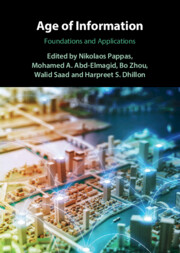Book contents
- Frontmatter
- Contents
- Contributors
- Acknowledgments
- 1 The Probability Distribution of the Age of Information
- 2 On the Distribution of AoI
- 3 Multisource Queueing Models
- 4 Controlling the Age of Information: Buffer Size, Deadlines, and Packet Management
- 5 Timely Status Updating via Packet Management in Multisource Systems
- 6 Age of Information in Source Coding
- 7 Sampling and Scheduling for Minimizing Age of Information of Multiple Sources
- 8 Age-Efficient Scheduling in Communication Networks
- 9 Age-Driven Transmission Scheduling in Wireless Networks
- 10 Age of Information and Remote Estimation
- 11 Relation between Value and Age of Information in Feedback Control
- 12 Age of Information in Practice
- 13 Reinforcement Learning for Minimizing Age of Information over Wireless Links
- 14 Information Freshness in Large-Scale Wireless Networks: A Stochastic Geometry Approach
- 15 The Age of Channel State Information
- 16 Transmission Preemption for Information Freshness Optimization
- 17 Economics of Fresh Data Trading
- 18 UAV-Assisted Status Updates
- Index
6 - Age of Information in Source Coding
Published online by Cambridge University Press: 02 February 2023
- Frontmatter
- Contents
- Contributors
- Acknowledgments
- 1 The Probability Distribution of the Age of Information
- 2 On the Distribution of AoI
- 3 Multisource Queueing Models
- 4 Controlling the Age of Information: Buffer Size, Deadlines, and Packet Management
- 5 Timely Status Updating via Packet Management in Multisource Systems
- 6 Age of Information in Source Coding
- 7 Sampling and Scheduling for Minimizing Age of Information of Multiple Sources
- 8 Age-Efficient Scheduling in Communication Networks
- 9 Age-Driven Transmission Scheduling in Wireless Networks
- 10 Age of Information and Remote Estimation
- 11 Relation between Value and Age of Information in Feedback Control
- 12 Age of Information in Practice
- 13 Reinforcement Learning for Minimizing Age of Information over Wireless Links
- 14 Information Freshness in Large-Scale Wireless Networks: A Stochastic Geometry Approach
- 15 The Age of Channel State Information
- 16 Transmission Preemption for Information Freshness Optimization
- 17 Economics of Fresh Data Trading
- 18 UAV-Assisted Status Updates
- Index
Summary
This chapter explores Age of Information (AoI) in the context of the timely source coding problem. In most of the existing literature, service (transmission) times are based on a given distribution. In the timely source coding problem, by using source coding schemes, we design the transmission times of the status updates. We observe that the average age minimization problem is different than the traditional source coding problem, as the average age depends on both the first and the second moments of the codeword lengths. For the age minimization problem, we first consider a greedy source coding scheme where all realizations are encoded. For this source coding scheme, we find the age-optimal real-valued code word lengths. Then, we explore the highest k selective encoding scheme, where instead of encoding all realizations, we encode only the most probable k realizations. For each source encoding scheme, we first determine the average age expressions and then, for a given pmf, characterize the age-optimal k value, and find the corresponding age-optimal codeword lengths. Through numerical results, we show that selective encoding schemes achieve lower average age than encoding all realizations.
Information
- Type
- Chapter
- Information
- Age of InformationFoundations and Applications, pp. 140 - 165Publisher: Cambridge University PressPrint publication year: 2023
